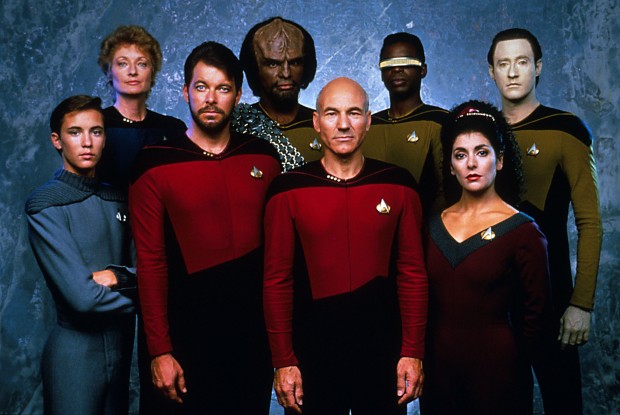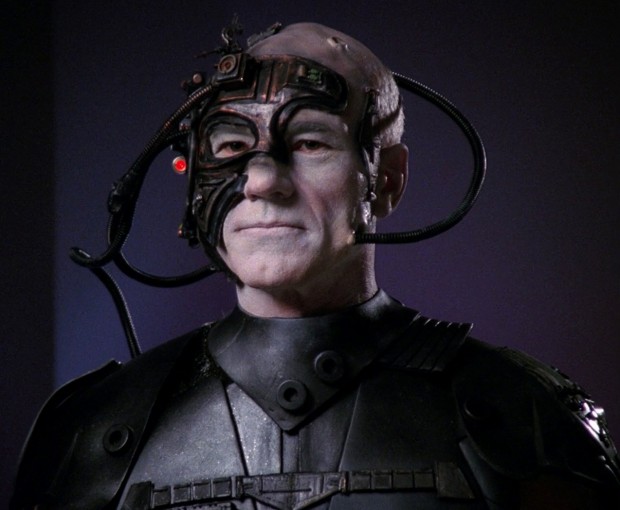You have no items in your cart. Want to get some nice things?
Go shoppingNot just a simple utopia.

Star Trek has a reputation for presenting a utopian future – one where humanity has outgrown our “infantile” stages, and matured into a society where money no longer exists and personal gain is no longer the sole goal in human life. Medical advances have eradicated most diseases alongside discrimination and poverty. Whilst this much is certainly true of the society portrayed in Star Trek, this is not the end of the story.
Look a little closer and you’ll see more than a simple utopia. In particular, the most popular continuation of the Star Trek universe, Star Trek: The Next Generation, large dystopian elements in the total view of its universe become very prevalent. Take, for example, the number of events that occur that completely change the perspective from which various races are viewed. From the profit-oriented Farengi, to the self-centred Romulans, to the warlike Klingons, to the mischievous god-like being Q, or even to the career-focussed Starfleet members that join the starship Enterprise, it would appear that only the overall state of humanity, not the universe as a whole, could be described as utopian. In The Next Gneration, discrimination and prejudice amongst humans are destroyed only because external forces – in this case, aliens – provide humanity with a common element against which we can define ourselves.
In many ways The Next Generation‘s more complex vision of the future is expressed through the show’s two chief adversaries, who happen to both be far more advanced than humanity. Firstly, we have the over-arching enemies in the series, the Borg, a cybernetic race that states its intentions with the show’s most famous lines:
“We are the Borg. Lower your shields and surrender your ships. We will add your biological and technological distinctiveness to our own. Your culture will adapt to service us. Resistance is futile.”

When the most advanced race in the Star Trek universe has the most basic and aggressive of principles at its core, that of conquest, it certainly changes the interpretation of the universe as a straight-forward utopia. Indeed, it implies a far more complex message underlying the whole situation: that no matter whether or not humanity can achieve a “perfect” society, other races and even the universe at large either can’t or won’t do the same.
After all, the very fact that the universe portrayed still contains various large scale conflicts raging over vast distances of space and hundreds of years, tells us that even in this perfect society, the advent of war remains the only constant in history, even in the prediction of the future. Indeed, conflict is a recurring theme across the Star Trek series, and the reasons for these conflicts vary as much as they do in the 21st century: from simple property disputes, to leadership disputes and desire for land (or entire planets). This in itself reveals that even the creators of a utopian human society believe that some of the more ugly sides of existence will never go away.
We must bear this in mind when coming to the second main adversary of the series, Q. He provides Star Trek‘s interesting take on the development of species. Q is a being of god-like power, capable of doing quite literally anything at a snap of his fingers. His first interaction with the enterprise crew is to put them on trial for the “barbarism” of the human race, a point which he demonstrates by taking excerpts from human “history” including our near-future “post-apocalyptic” state, after a global nuclear war. The fact that it is shown that humans went through the most common of predictions for the human race – self-annihilation – before becoming an almost devolved society (certainly so in Q’s demonstration), before eventually being elevated to a far better state – the almost utopian future – tells us that the Star Trek universe’s prediction for humanity isn’t all roses. According to The Next Generation, things get worse before they get better; and even then, it takes the intervention of the Vulcans to develop humans from their post-apocalyptic tribal state. Despite humanity’s apparent surpassing of its baser instincts, Q represents something intriguing – the idea that when evolution has taken us far beyond our current state, the basic instincts and behaviours of our race still remain.
Q also provides us with the insight that the most developed race in the Star Trek universe consists of near god-like beings, but with very basic flaws such as arrogance, jealousy, pride and greed. This demonstrates that the vision of the future for humanity in Star Trek is actually almost bleak, with it only being the intervention of an already “superior” society allowing the human race to develop into a cultured, almost symbiotic near-utopia. However it is this part of the future presented in Star Trek that is most comforting. In The Next Generation, the human race learns from its mistakes, as it attempts to spread its utopian ideals to other planets just as the Vulcans did for them, forming the peaceful United Federation of Planets. So whilst the utopia that Star Trek is famous for might not be as wonderful as at first glance, and the galaxy as a whole doesn’t appear a very savoury place, the message of Star Trek: The Next Generation is ultimately the inspiring notion that utopia isn’t natural, but can be created – and humanity can pave the way.




